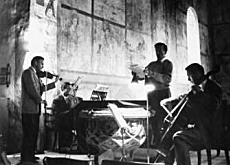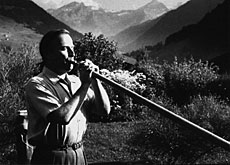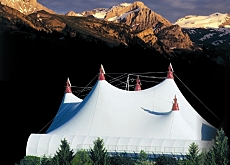How music made the Gstaad myth

Gstaad has no high peaks yet its reputation still soars thanks to the celebrities who have flocked there for years, led by the great violinist, Yehudi Menuhin.
The alpine village is celebrating the 50th edition of the Menuhin classical music festival this summer, which also marks half a century of the resort’s star appeal.
Menuhin, who died at age 82 in 1999, developed a love for the mountains during the first summer he spent in Romania’s Carpathian range as a 13-year-old boy.
He came to Gstaad in the 1950s but why choose this resort when there are so many other villages in the Swiss Alps blessed with higher mountains and more spectacular scenery?
There are many reasons that only become apparent while visiting the place and talking to some of the people who knew Menuhin.
Gstaad still retains an air of rustic authenticity; there are no high-rise apartment blocks disturbing the views or any sprawl of holiday homes, and the ski lifts are discretely placed on the mountainsides. In fact, it has not changed much outwardly since 1954, the year the virtuoso spent his first summer in a Swiss chalet.
A typewritten letter Menuhin sent to the chalet owner setting down his rental conditions – not the other way around – has been preserved by Rolf Steiger, a retired doctor, patron of the arts and driving force behind the Menuhin Center in the neighbouring village of Saanen.
Steiger is also co-author of a new book, “Gstaad and the Menuhins”, published this summer to mark the anniversary.
While wandering around the displays of old photographs, books and mementos, Steiger explains that it was the private teacher of Menuhin’s children who recommended the resort because of the high standing of its international schools.
Chord struck
The village name must have struck a chord with the violinist who had already been told by a Californian friend that it was a wonderful place for a holiday, and had a church ideal for concerts.
As fate would have it, Menuhin’s arrival on the scene coincided with the start of the long career of Gstaad’s charismatic tourist director, Paul Valentin.
Valentin boldly asked Menuhin in 1956 if he would not mind performing a concert or two to drum up business for the slow summer months. The music festival followed the very next year, and with it, Gstaad’s reputation grew.
By the 1960s, the village was a place to be seen. A temporary exhibition of black and white photos at Saanen’s museum shows Valentin hobnobbing with the Hollywood elite, European royalty and many other members of the jet set.
A life-size puppet of the tourist director wearing a fake nose and silly hat sits at a piano as he once did to entertain the stars.
Valentin knew how important it was to keep them coming back, since the countless articles printed in celebrity magazines about the jet set in Gstaad was the best advertising any resort could wish for, and was free to boot.
Star appeal
The star appeal drove up property prices as the rich and famous sought exclusive chalets and rooms in luxury hotels, but a building boom on the scale of what has been seen in Zermatt, St Moritz or Verbier did not happen.
The current president of the Menuhin Festival Gstaad, Leonz Blunschi, says this was due to the decision by the local authorities who acted in defence of the region’s farmers and its traditions as a rural community by not loosening zoning laws.
Blunschi is a former owner and director of Gstaad’s Bernerhof hotel, and a keen hiker.
As he crosses the railway tracks to follow the Yehudi Menuhin Philosophy Path, he leaves behind the small centre of the village with its chalets housing Swiss banks, insurance companies and exclusive watch shops and steps immediately into the picture postcard countryside.
“To be renewed it is essential to consider the old which we inherited,” are the Menuhin words of wisdom on the third signpost.
“He never forgot to give the locals credit for keeping the land as it is,” Blunschi remembers. “That’s why he liked it. The gentle rolling hills give one a sense of well-being.”
The festival president adds that the people of the region are more open-minded than elsewhere in the Alps, reflecting the broad valleys in which they live – not hemmed in by steep cliffs or living in the shadows of towering peaks.
It was this open-mindedness, and the pioneering role played by the Menuhin festival that paved the way for Gstaad to become home to a number of international summer events, including polo and beach volleyball competitions, a top-ranked tennis tournament and a country music festival. The resort has remained in the spotlight.
“Someone like Yehudi Menuhin, who was a humanist, philosopher, teacher and a musician, was known to the whole world,” explains Steiger.
“That’s the reason we want to keep his name on the festival – to show this open mind, this internationality with the focus on people and music as the universal language.”
swissinfo, Dale Bechtel in Gstaad
The Bernese Oberland resort of Gstaad and the surrounding villages have around 7,500 inhabitants.
Around 90 per cent of the population live directly or indirectly from tourism.
However, agriculture is still important to the region, which counts around 90 farms.
The ski resorts are also popular for hiking in summer, and attracts tens of thousands of summer visitors to a wide variety of sporting and cultural events.
The Menuhin festival began 50 years ago with two concerts given by Yehudi Menuhin and friends at the church in Saanen.
There will be 40 concerts this year spread among the festival’s famous tented concert hall in Gstaad and churches in nearby villages.
Around 18,000 people are expected to attend the events taking place between July 21 and September 2.

In compliance with the JTI standards
More: SWI swissinfo.ch certified by the Journalism Trust Initiative












You can find an overview of ongoing debates with our journalists here . Please join us!
If you want to start a conversation about a topic raised in this article or want to report factual errors, email us at english@swissinfo.ch.